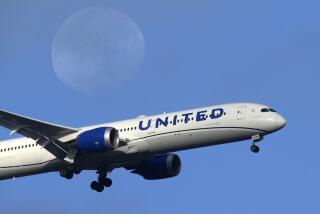A NEW CONNECTION
- Share via
The skies over Southern California just got a lot friendlier for SkyWest Inc.
SkyWest is the parent of SkyWest Airlines, a Western regional carrier whose 60 (mostly turboprop) aircraft make nearly 560 daily departures. In California, SkyWest mainly operates as the “Delta Connection,” ferrying people between several cities and Delta Air Lines flights at Los Angeles International Airport.
Trouble is, Delta has been paring its presence at LAX over the years, and that’s eroded SkyWest’s feeder business in the region. A decade ago, Delta had 110 flights departing LAX daily; now it has 65, according to SkyWest.
“SkyWest has had fewer and fewer Delta flights to feed at L.A. . . . so our California route system became less profitable,” said Steven Hart, vice president for market development at SkyWest, which is based in St. George, Utah.
But SkyWest got a big boost recently when United Airlines, the nation’s biggest carrier and the largest operator at LAX, signed up SkyWest to handle much of its connecting service between LAX and other Western cities, a service run under the name United Express.
Starting Oct. 1, SkyWest (as United Express) will fly 118 daily departures from LAX to cities such as Santa Barbara and Fresno, and to Orange County’s John Wayne Airport. SkyWest currently provides service to 47 cities in 12 states and to Vancouver, Canada.
In the transaction, United gave SkyWest some of the connecting routes that are being served by another regional airline, Mesa Air Group Inc. Mesa will continue running its own version of United Express to cities that SkyWest won’t be serving, Hart said.
The United connection could help smooth out SkyWest’s profitability, which has been ragged in recent years because of the shrinking Delta service, costs related to SkyWest’s replacement of its 19-seat turboprop aircraft with nicer, bigger planes, and fare wars between the much larger Southwest Airlines and United’s Shuttle by United.
In its fiscal year ended March 31, SkyWest’s earnings rose to $10.1 million from $4.4 million the prior year, as revenue climbed to $283 million from $252 million. But the latest profit was still off 30% from three years earlier, when SkyWest earned $14.4 million on revenue of only $188 million.
Ironically, the main beneficiary of the stock’s United-related surge is Delta, SkyWest’s biggest shareholder, with a 15% stake.
Dueling Freight Trains
How are Union Pacific Corp. and Burlington Northern Santa Fe Corp. handling their huge takeovers of California railroads? Using just one slender yardstick--their stock prices--Union Pacific has the edge so far.
Shares of Union Pacific, which bought ailing Southern Pacific Rail Corp. in September for $5.4 billion, are up a handsome 44% for the last 12 months, to a recent $69 a share.
But the shares of BNSF, which purchased Santa Fe in September 1995 for $4 billion, are up only 12% over the last year to a recent $91.75 a share--well below the 30% gain recorded by Standard & Poor’s index of rail issues in that period. And BNSF’s stock has risen only 31% since the transaction closed.
Fort Worth-based BNSF has struggled with the combined operations. For a while it had too many locomotives in some regions, too few in others. It also suffered from terrible winter storms this year. The company’s performance became slow and erratic.
Now, however, the railroad is improving. BNSF’s second-quarter profit this year exceeded Wall Street expectations, and analysts say the company is doing a better job of streamlining and wringing excess costs out of the merged operation. It recently combined the former Burlington Northern and Santa Fe rail systems under one computer system.
Investors are taking notice. Since mid-April, BNSF’s stock has jumped 27%, outpacing the overall stock market.
*
James F. Peltz can be reached at james.peltz@latimes.com
More to Read
Inside the business of entertainment
The Wide Shot brings you news, analysis and insights on everything from streaming wars to production — and what it all means for the future.
You may occasionally receive promotional content from the Los Angeles Times.











